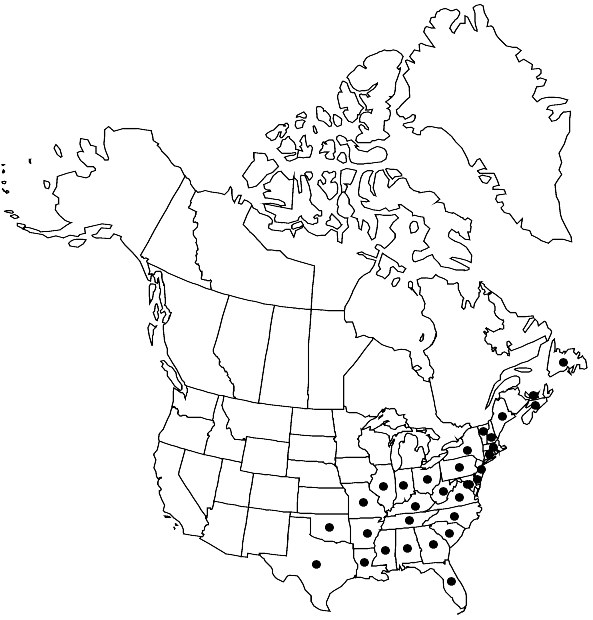Difference between revisions of "Sphagnum affine"
Rev. Bryol. 12: 44. 1885,.
FNA>Volume Importer |
imported>Volume Importer |
||
| (One intermediate revision by the same user not shown) | |||
| Line 57: | Line 57: | ||
|publication year= | |publication year= | ||
|special status= | |special status= | ||
| − | |source xml=https:// | + | |source xml=https://bitbucket.org/aafc-mbb/fna-data-curation/src/2e0870ddd59836b60bcf96646a41e87ea5a5943a/coarse_grained_fna_xml/V27/V27_8.xml |
|genus=Sphagnum | |genus=Sphagnum | ||
|section=Sphagnum sect. Sphagnum | |section=Sphagnum sect. Sphagnum | ||
Latest revision as of 21:28, 5 November 2020
Plants moderate-sized and lax to somewhat compact, ± stiff-stemmed; moderate-sized to large, forming lawns or low, loose hummocks; green, yellow-brown to golden brown and often tinged with brown to purplish brown; capitulum ± flat in lax open-grown forms to ± rounded and compact in open-grown forms. Stems brown, superficial cortical layer with spiral reinforcing fibrils clearly visible, usually 2 or more pores per cell, comb-fibrils visible on interior wall. Stem leaves to 1.3–1.9 × 0.6–1.2 mm; rarely hemiisophyllous; hyaline cells non-ornamented, nonseptate or sometimes septate. Branches ± tapering, leaves loosely imbricate to spreading and often squarrose in shade forms. Branch fascicles with 2 spreading and 2–3 pendent branches. Branch stems with cortical cell comb-lamellae weakly differentiated on interior wall, no or weak funnel-like projections on the interior end walls, pores in superficial wall mostly restricted to leaf attachments. Branch leaves ovate to ovate elliptical, 1.5–2 × 0.9–1.6 mm; hyaline cells on convex surface with elliptic to more often round pores along the commissures, comb-lamellae can be present, but often absent or restricted to leaf bases; chlorophyllous cells broadly triangular in transverse section and well-enclosed on the convex surface; end wall not thickened. Sexual condition dioicous. Capsule with scattered pseudostomata. Spores 27–31 µm; granulate on both surfaces; laesura on proximal surface less than 0.5 the spore radius.
Phenology: Capsules fairly common, mature early to late summer.
Habitat: Widespread and often ruderal, wide variety of minerotrophic wetlands, especially abundant in forested mires
Elevation: low to moderate elevations
Distribution

Nfld. and Labr. (Nfld.), N.S., P.E.I., Ala., Ark., Conn., Del., D.C., Fla., Ga., Ill., Ind., Ky., La., Maine, Md., Mass., Miss., Mo., N.H., N.J., N.Y., N.C., Ohio., Okla., Pa., R.I., S.C., Tenn., Tex., Vt., Va., W.Va., Europe.
Discussion
Sphagnum affine may occur elsewhere but the taxonomy is unclear (K. I. Flatberg 1984). Although species of sect. Sphagnum are notoriously difficult to tell apart in the field, S. affine is typically smaller than S. centrale, S. palustre, and S. papillosum, the other brown species of this section with which it may occur. It is also much more likely to have somewhat squarrose branch leaves, especially in shade forms.
Selected References
None.